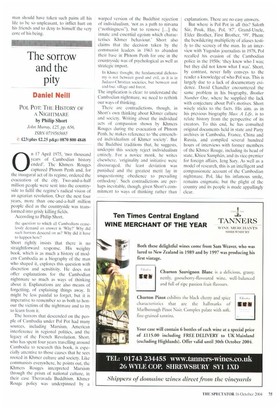The sorrow and the pity
Daniel Neill
POL POT: THE HISTORY OF A NIGHTMARE
by Philip Short John Murray, 125, pp. 656, ISBN 0719565685 123( plus £2.25 p&p) 0870 800 4848 0 n 17 April 1975, 'two thousand years of Cambodian history ended'. The Khmers Rouges captured Phnom Penh and, for the inaugural act of its regime, ordered the evacuation of the city. Two-and-a-half million people were sent into the countryside to fulfil the regime's radical vision of an agrarian revolution. Over the next four years, more than one-and-a-half million people died as the countryside was transformed into grisly killing fields.
According to Philip Short,
the question to which all Cambodians ceaselessly demand an answer is 'Why?' Why did such horrors descend on us? Why did it have to happen here?
Short rightly insists that there is no straightforward response. His weighty book, which is as much a history of modern Cambodia as a biography of the man who shaped it, explores this question with discretion and sensitivity. He does not offer explanations for the Cambodian nightmare so much as ways of thinking about it. Explanations are also means of forgetting, of explaining things away. It might be less painful to forget, but it is imperative to remember so as both to honour the victims of the nightmare and to tr. to learn from it.
The horrors that descended on the people of Cambodia under Pot Pot had many sources, including Marxism, American interference in regional politics, and the legacy of the French Revolution. Short, who has spent four years travelling around Cambodia to research this book, is especially attentive to those causes that he sees rooted in Khmer culture and society. Like communists everywhere, he points out, the Khmers Rouges interpreted Marxism through the prism of national culture, in their case Theravada Buddhism. Khmer Rouge policy was underpinned by a warped version of the Buddhist rejection of individualism, 'not as a path to nirvana ("nothingness"), but to remove [...1 the innate and essential egoism which characterises Khmer behaviour.' Short also claims that the decision taken by the communist leaders in 1963 to abandon their base in Phnom Penh for one in the countryside was of psychological as well as strategic import.
In Khmer thought, the fundamental dichotomy is not between good and evil, as it is in Judaeo-Christian societies, but between srok and bmi village and forest.
The implication is clear: to understand the Cambodian nightmare, we need to rethink our ways of thinking.
There are contradictions, though, in Short's own thinking about Khmer culture and society. Writing about the individual acts of compassion shown by Khmers Rouges during the evacuation of Phnom Penh, he makes reference to 'the entrenched individualism of Khmer society'. But the Buddhist traditions that, he suggests, underpin this society reject individualism entirely. For a novice monk, he writes elsewhere, 'originality and initiative were discouraged, the least deviation was punished and the greatest merit lay in unquestioning obedience to prevailing orthodoxy'. Such contradictions are perhaps inevitable, though, given Short's commitment to ways of thinking rather than
_ explanations. There are no easy answers.
But where is Pol Pot in all this? Saloth Sar, Pouk, Hay, Pol, '87', Grand-Uncle, Elder Brother, First Brother, '99', Phem: the bewildering multiplicity of aliases testify to the secrecy of the man. In an interview with Yugoslav journalists in 1978, Pol recalled his evasion of the Cambodian police in the 1950s: 'they knew who I was; but they did not know what I was'. Short, by contrast, never fully conveys to the reader a knowledge of who Pol was. This is largely due to a lack of documentary evidence. David Chandler encountered the same problem in his biography, Brother Number (inc. where he supplied the lack with conjecture about Pol's motives. Short wisely sticks to the facts. His aim, as in his previous biography Mao: A Life, is to relate history from the perspective of its creators. To this end, he has consulted original documents held in state and Party archives in Cambodia, France, China and Russia, and compiled several hundred hours of interviews with former members of the Khmer Rouge, including its head of state, Khieu Samphan, and its vice-premier for foreign affairs, leng Sary. As well as a model of research, this is an intelligent and compassionate account of the Cambodian nightmare. Poi, like his infamous smile, remains enigmatic, but the plight of the country and its people is made appallingly clear.










































































































 Previous page
Previous page